LIVE: Hassan gets fresh term as Tanzania president after winning violent, contentious vote by 98%

Tune in to Global South World’s live coverage of the vote canvassing and proclamation of the winner in Tanzania’s October 29 elections, where more than 37 million voters picked their next leader from a shallow mix that excluded key opposition candidates.
LIVE UPDATES
This concludes our coverage of the October 29 elections in Tanzania, where incumbent leader President Samia Suluhu Hassan prepares to begin a fresh five-year term amid growing unrest and violence. Follow Global South World's official social media pages for more post-election updates from Tanzania.
Hassan declared winner by 98%
Tanzania's electoral commission declared on Saturday that President Samia Suluhu Hassan had won, with nearly 98% of the votes, an election that set off violent protests across the country this week.
The result hands Hassan, who took power in 2021 after the death in office of her predecessor, a five-year term to govern the East African country of 68 million people.
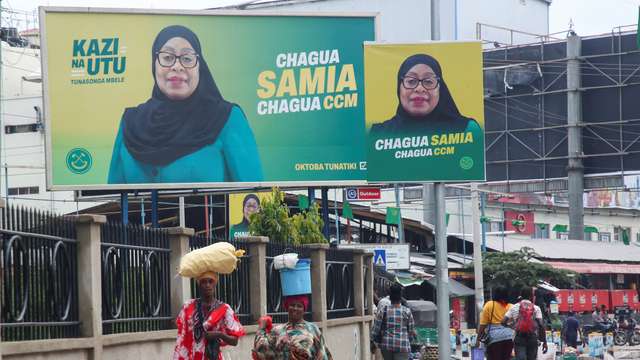
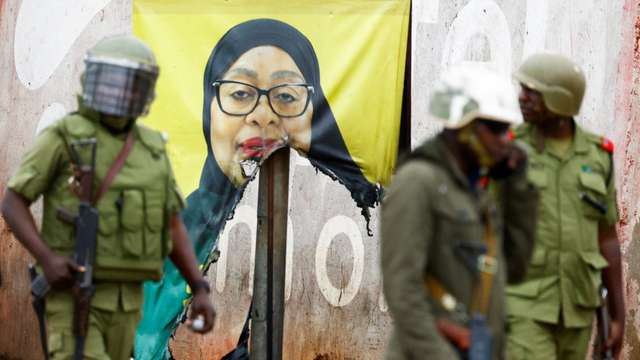
Protests erupted during Wednesday's vote for president and parliament, with some demonstrators tearing down banners of Hassan and setting fire to government buildings and police firing tear gas and gunshots, according to witnesses.
Demonstrators are angry about the electoral commission's exclusion of Hassan's two biggest challengers from the race and what they described as widespread repression.
Tanzania's main opposition party said on Friday that hundreds of people had been killed in the protests, while the U.N. human rights office said credible reports indicated at least 10 people were killed in three cities.
The government dismissed the opposition's death toll as "hugely exaggerated" and has rejected criticism of its human rights record.
Reuters could not independently verify casualty figures.
COMMISSION SAYS TURNOUT WAS 87%
The electoral commission said that Hassan received more than 31.9 million votes, or 97.66% of the total, with turnout nearing 87% of the country's 37.6 million registered voters.
Turnout appeared low on election day, according to witnesses, with some polling stations disrupted by the protests.
The Tanzanian authorities have imposed a nationwide curfew for the past three nights and restricted access to the internet.
Foreign Affairs Minister Mahmoud Thabit Kombo on Friday denied allegations that security services had used excessive force, saying there had only been a "very few small pockets of incidents" caused by criminal elements.
U.N. Secretary-General Antonio Guterres, in a statement issued on Friday by his spokesperson, called "for a thorough and impartial investigation into all allegations of excessive use of force" and deplored the loss of life.
RECENT CRITICISM FOR HASSAN
Hassan, 65, won praise after taking office in 2021 from predecessor John Magufuli for easing repression that increased under his tenure but has more recently faced criticism from opposition parties and activists after a series of arrests and alleged abductions of opponents.
She has denied allegations of widespread rights abuses. Last year, she said she had ordered an investigation into reports of abductions, but no official findings have been released.
During the campaign, she touted accomplishments expanding road and railway networks and increasing power generation capacity.
The main opposition party CHADEMA had called for protests during the election, which it said amounted to a "coronation".
CHADEMA was disqualified in April from the election after it refused to sign a code of conduct, and its leader Tundu Lissu was charged with treason.
The commission also disqualified the candidate for opposition party ACT-Wazalendo, leaving only minor parties to take on Hassan.
Violence breaks out in Tanzania's biggest city
Tanzania’s largest city, Dar es Salaam, descended into chaos on Wednesday, October 29, as protests broke out during the country’s general elections.
Demonstrators clashed with police, reportedly setting a police station ablaze and damaging public property.
A video by Viory showed a column of smoke rising over the city. The protests, led by opposition supporters, called for political reforms and transparency in the electoral process.
Police used tear gas to disperse crowds, and authorities have imposed a curfew. Internet disruptions were also reported nationwide.
President Samia Suluhu Hassan, expected to secure re-election, has faced accusations of stifling dissent after key opposition candidates were disqualified. Human rights groups have condemned recent crackdowns on free speech and political activity.
Ballots destroyed and officials flee as protests escalate
Reports from local sources describe ballots being destroyed and scattered on the streets as protests intensified. Election officials allegedly abandoned polling stations amid the unrest, raising further doubts about the credibility of the electoral process and the government’s ability to maintain control.
Police stations torched in Dar es Salaam and Arusha
Protesters burned police stations in both Dar es Salaam and Arusha, and a police patrol vehicle was also set alight in Dar es Salaam. The attacks on security infrastructure signal rising anger on the streets and a growing breakdown of public order.
Defiance on the streets as protests continue despite curfew
Demonstrations persist across Tanzania even after police enforced a nationwide curfew. Crowds have defied restrictions, demanding accountability and transparency following the country’s disputed election.
Influx of wounded patients at Muhimbili Hospital
Muhimbili National Hospital is witnessing an influx of injured patients following post-election violence across the city, hospital sources told the BBC. The surge in casualties comes as protesters took to the streets demanding electoral reforms and the restoration of free political activity. Demonstrators set vehicles ablaze and damaged public infrastructure in various parts of Dar es Salaam, prompting a swift response from authorities.
Tanzania’s police chief, Camillus Wambura, imposed a citywide curfew starting from 6:00 p.m. local time (15:00 GMT), urging residents to remain indoors. No end date for the curfew has been provided.
Dar es Salaam’s Regional Commissioner, Alfred Chalamila, warned earlier that the government would take firm action against anyone disturbing public order. Protests were also reported in other parts of the country, including Mbeya and Tunduma. “We are tired,” a protester told the BBC. “We want an independent electoral commission so that every Tanzanian can choose the leader they want.”
Opposition suppression, new promises, chaos – Tanzania’s incumbent president readies for another term?
Incumbent President Samia Suluhu Hassan and her ruling party, Chama Cha Mapinduzi (CCM), are widely expected to secure another term in office, as the country has wrapped up the nationwide vote.
But the path to re-election has been marked by the suppression of opposition voices, raising new concerns over the country’s democratic course.
Now there are widespread demonstrations across the country following the close of polls.
President Samia, who took office in 2021 following the death of former leader John Magufuli, is seeking her first full term. Since then, she has positioned herself as a reformer and bridge-builder, especially in international circles, but at home, her government has been criticised for systematically sidelining opposition figures and dissent. Read more.
US Embassy issues security alert over post election unrest
The U.S. Embassy in Tanzania has issued a security alert to American citizens and embassy staff following reports of demonstrations and unrest in several parts of the country after the elections.
According to the advisory, Tanzanian police have imposed a curfew in Dar es Salaam beginning at 6:00 p.m. on October 29, as security forces respond to protests in multiple locations. The embassy warned that the situation remains fluid, with reports of ongoing demonstrations and an increased security presence across major cities.
The embassy instructed U.S. government personnel to shelter in place at their residences and announced that, for October 30, operations at the U.S. Embassy in Dar es Salaam will be limited to emergency consular services only.
Social media reactions to curfew, alleged internet shutdown in Tanzania
Many Tanzanian netizens are reporting difficulties accessing platforms like X without resorting to VPNs. Digital rights commentators say these shutdowns curtail freedom of expression and limit democratic dialogue. For example, scholars warn that internet blackouts reduce the available space for political debate, activist organising, and citizen oversight. Some social media users are expressing frustration and fear - citing that restrictions may signal an attempt to limit dissent ahead of election results.
Unrest spreads across Tanzania as protests turn violent
In the hours following the vote, Tanzania has descended into turmoil.
Protesters have taken to the streets, torching buildings and destroying property in several regions, as anger over the electoral process intensifies. Police forces have been deployed nationwide, attempting to contain the chaos and restore order. But with demonstrations spreading and communication networks disrupted, the scale of unrest now threatens to overshadow the very legitimacy of Tanzania’s election.
President Samia cast her vote, urged Tanzanians to turn out peacefully
President Samia Suluhu Hassan began the day by expressing gratitude to Almighty God after joining fellow citizens of Chamwino to cast her vote. The Head of State described it as “a blessed morning,” commending the sense of unity and civic responsibility shown by voters who turned up early across the country.
President Samia encouraged all Tanzanians to continue turning out in large numbers to vote peacefully and calmly, noting that millions had already participated in an orderly manner. She emphasized that maintaining peace and stability during the election process was vital to strengthening democracy and ensuring that every citizen’s voice is heard.
Silence and tension mark Tanzania’s election day
In Tanzania, the right to vote has collided with the struggle to be heard.
As the country heads to the polls, violent clashes and an internet blackout have plunged the electoral process into uncertainty. Reports from local media describe streets under tight security, opposition leaders detained, and voters struggling to access information or communicate online. With most social networks blocked and news outlets operating under pressure, Tanzania’s election unfolds in a climate of fear and silence - one where the flow of information may prove as decisive as the vote itself.
Tanzania’s 2025 elections face a crisis of information control
In Tanzania today, truth itself has become a battleground.
As the country approaches its general elections on October 29, 2025, it is not the ballot box but the control of information that may decide the nation’s future. Across newsrooms, churches, and social media, fear and censorship are reshaping the space for public debate and democracy.
Over recent years, the government has steadily tightened control over what citizens can read, post, or even discuss. Key online platforms once central to public conversation -Twitter (now X), Clubhouse, Telegram, and the influential Tanzanian forum JamiiForums - have been blocked or restricted. Read more here.

Elections without opposition?
As Tanzanians prepare to vote in presidential, parliamentary, and local elections on Wednesday, October 29, much of the opposition has been pushed to the margins, with leading parties boycotting the race and several candidates disqualified or silenced.
The election is officially set to feature 17 presidential contenders, but only one, incumbent President Samia Suluhu Hassan of the ruling Chama Cha Mapinduzi (CCM), enjoys national recognition and institutional backing.
The imbalance has prompted critics to question whether the poll represents a genuine democratic contest or simply a formality to extend CCM’s near five-decade rule. More here.

Blind political loyalty
In Tanzania, as in many African democracies, politics has become less about reform and more about political loyalty.
Politics in Tanzania is now less about policy and more about belonging – cheering for a team instead of striving for better governance. And when loyalty overshadows ideas, meaningful change disappears.
Once political identity becomes part of who we are – “I am CCM” or “I am Chadema” – the goal shifts. People stop comparing policies and start defending their side while attacking the other. Political scientists call this affective polarisation: when people become emotionally attached to one camp and hostile toward another, no matter the issues. More here.

Controversial promises ahead of the elections
As Tanzanians vote in the 2025 general election, the campaign period closed with promises made over the past two months taking centre stage – some attracting attention for their controversy. The October 29 polls will elect the president, members of the National Assembly, and ward councillors. Campaigning officially began on 28 August and has been marked less by policy debate than by a series of unconventional pledges that have sparked both amusement and debate. While some of these promises appear light-hearted, analysts suggest their prominence reflects the limited participation of major opposition figures in this year’s race. Read more here.
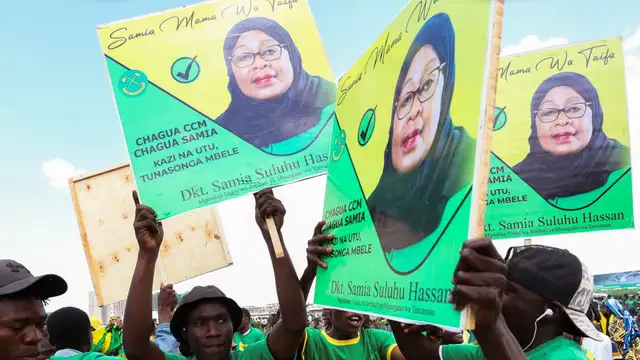
Tanzania heads to the polls today in a high-stakes vote that could cement the ruling CCM party’s seven-decade grip on power.
With opposition candidates sidelined by arrests and intimidation, President Samia Suluhu Hassan appears poised to secure another term amid calls for fair competition and political reform.
Meet the candidates for next Tanzanian president
Over 37 million Tanzanian voters head to the polls today to select their new leader under a tense political climate marked by limited media access and growing state control.
Who among them will prevail?
Polls opened at 4 am GMT and closed at 1 pm GMT— vote counting is underway, and results will be made public within three days, according to the election commission.

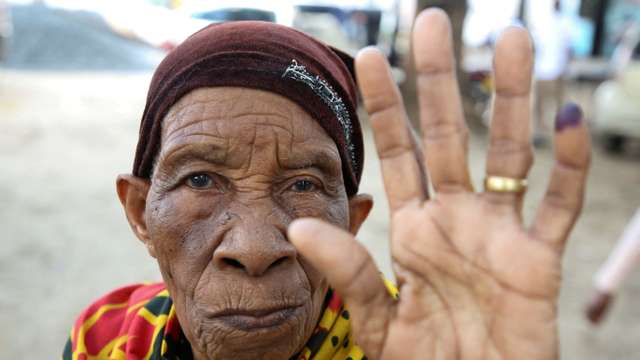
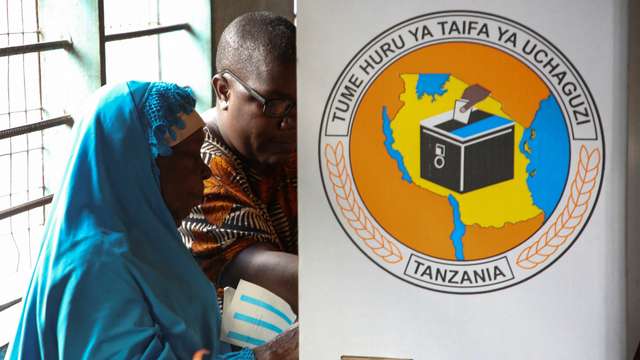





BACKGROUND
Post-election protests turn violent
Violent protests broke out in Tanzania's biggest city, Dar es Salaam, on Wednesday during an election, President Samia Suluhu Hassan is expected to win following the disqualification of the leading opposition candidates.
Internet service was disrupted across the country, monitor group NetBlocks said, as unverified videos of young protesters throwing rocks at security forces and a petrol station in flames circulated on social media.
Hundreds of protesters were marching towards the Selander Bridge that leads to Dar es Salaam's centre, said a witness who asked not to be named.
Witnesses reported violent protests in at least four neighbourhoods of Dar es Salaam, while video from BBC Swahili showed police using tear gas to disperse protesters in another part of the city.
Who’s in
- Samia Suluhu Hassan (Chama Cha Mapinduzi - CCM)
The incumbent president and the first woman to lead Tanzania, Suluhu Hassan has years of experience in government and initially projected herself as a moderate reformer. Running with Emmanuel Nchimbi as her vice-presidential candidate, she remains the dominant political figure in the race. Her strongest potential challengers, particularly from the Chadema opposition party, have been weakened by systematic state pressure. Opposition leaders have faced legal restrictions, arrests, and in some cases, violent intimidation. This has left Tanzania’s political opposition fragmented and largely unable to mount an effective national campaign.
- Othman Masoud Othman (Alliance for Change and Transparency – ACT Wazalendo):
Masoud, the former First Vice President of Zanzibar, has emerged as the main opposition figure in the campaign. Known for his legal background and measured political style, he has positioned himself as a reformist voice advocating for stronger governance, youth empowerment, and greater autonomy for Zanzibar within the union.
Although the National Electoral Commission reportedly barred his candidacy earlier this year, ACT Wazalendo continued to campaign with him as its symbolic presidential representative, drawing significant crowds, particularly in Zanzibar. His prominence underscores the frustration among opposition supporters over shrinking political space.
- Twailib Ibrahim Kadege (United People's Democratic Party – UPDP):
Kadege’s campaign centres on youth employment and vocational training, aiming to expand opportunities for young Tanzanians.
- Wilson Elias Mulumbe (Alliance for Democratic Change – ADC):
Mulumbe advocates for the use of satellite technology to boost sectors like agriculture, mining, and justice, and supports introducing dual citizenship to strengthen economic ties.
- Kunje Ngombale Mwiru (Alliance for Africa Farmers Party – AAFP):
Mwiru focuses on agricultural reform, proposing zonal markets, fixed crop and livestock prices, and 24-hour access to essential public services.
Who’s out
Much of the opposition in Tanzania has been pushed to the margins in the presidential, parliamentary and local elections, with leading parties boycotting the race and several candidates disqualified or silenced.
The election is officially set to feature 17 presidential contenders, but only one, incumbent President Samia Suluhu Hassan of the ruling Chama Cha Mapinduzi (CCM), enjoys national recognition and institutional backing.
The imbalance has prompted critics to question whether the poll represents a genuine democratic contest or simply a formality to extend CCM’s near five-decade rule.
Tanzania’s two largest opposition parties, CHADEMA and ACT-Wazalendo, are not taking part after accusing the government of orchestrating a systematic crackdown on dissent. Several of their key leaders have been barred from running, while others face ongoing court cases or arbitrary detention.
In April, the Independent National Electoral Commission (INEC) disqualified CHADEMA’s presidential candidate on what the party described as “manufactured technicalities.” International news agency Reuters later confirmed that other opposition figures were similarly struck off ballots at local and parliamentary levels.
Human rights groups, including Amnesty International, have reported a “climate of fear”, citing arbitrary arrests, media restrictions, and enforced disappearances in the lead-up to the vote.
“Authorities have intensified repression ahead of the elections, instilling fear among activists, journalists, and ordinary citizens,” Amnesty said in an October report.
When Samia Suluhu Hassan took office in 2021 following the death of John Magufuli, she was initially praised for loosening restrictions on the opposition and reopening civic space. But over time, that image has faded.
Opposition activists say the state has perfected a softer, procedural form of authoritarianism — one that relies less on overt violence and more on bureaucratic obstacles, judicial harassment, and control of the media landscape.
What’s at stake
Beyond the political contest, Tanzanians continue to grapple with everyday struggles; unreliable electricity, water shortages, unemployment, and poor healthcare.
Still, many voters feel there is little space for genuine alternatives, with the ruling party dominating the political narrative and state machinery.
Dearth of information
There are 17 candidates, but reliable information about most of them remains scarce. The campaign has been dominated by the ruling party’s candidate, while smaller contenders have struggled to gain visibility in a political environment marked by limited media access and growing state control.
The political climate is tense, with reports of repression, arrests, and intimidation targeting opposition figures. President Samia Suluhu Hassan, who assumed office in 2021 after the death of John Magufuli, entered power promising reform and reconciliation. However, critics argue that her government has since tightened its grip on the political system, leaving little room for genuine competition.
While smaller candidates remain part of the electoral process, there is very little publicly available information about most of them, and their campaigns receive limited coverage, giving them minimal capacity to challenge CCM’s entrenched dominance. Their participation, however, serves as a reminder of Tanzania’s multi-party structure, one that exists more in form than in genuine political balance.
This story is written and edited by the Global South World team, you can contact us here.